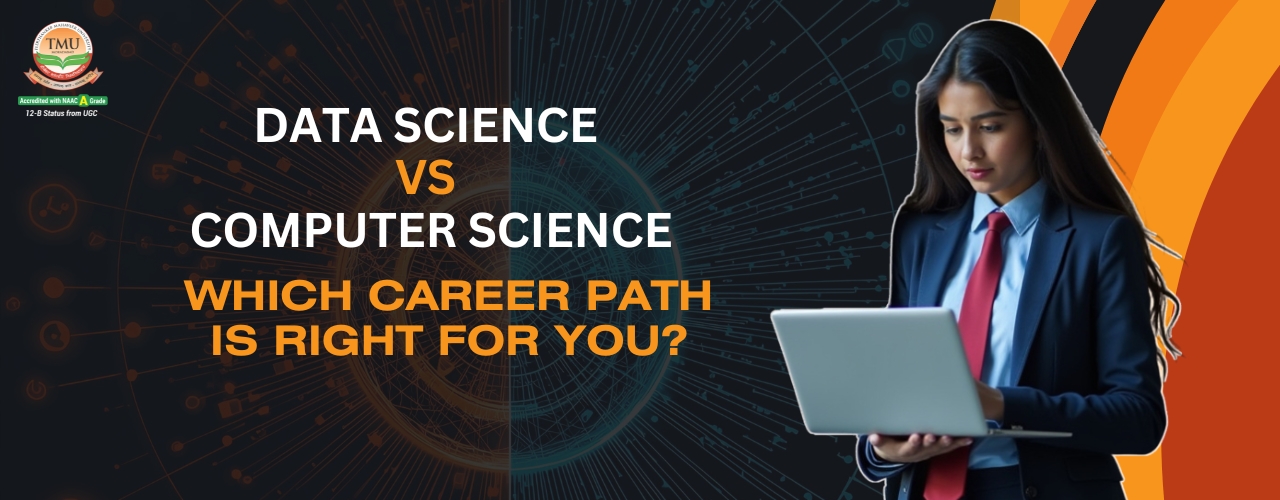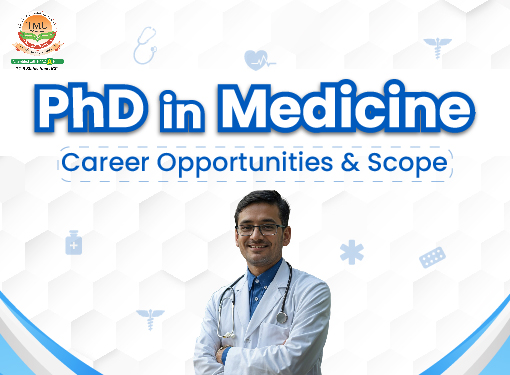Data Science vs. Computer Science: Which Career Path is Right for You?
Table of Contents
Choosing a career in technology can feel exciting and overwhelming at the same time. If you are someone who likes computers, problem-solving, or working with technology, you have probably heard about two popular career paths: Computer Science and Data Science. At first glance, Data Science and Computer Science may seem similar because both involve coding, technology, and logical thinking. However, when you look a little deeper, you begin to see clear differences between them, especially in their daily work, the skills they require, and the career goals they are designed to achieve.
Many students and professionals struggle to decide between Data Science vs. Computer Science because both fields offer high salaries, strong job demand, and long-term growth. Friends, family, and even the internet often give mixed advice. Some say Computer Science is more stable, while others say Data Science is the future. So which one is right for you?
The answer depends on your interests, strengths, and career expectations. Do you enjoy building software, apps, and systems from scratch? Or do you enjoy finding patterns in data and using numbers to tell stories? One path focuses more on creating technology, while the other focuses on using data to make smart decisions.
In this blog, we will break down Data Science and Computer Science in a very simple language. We will compare skills, education, job roles, salaries, and future scope. By the end of this article, you will have a clear idea of which career path matches your personality and goals. Think of this guide as a friendly conversation, not a textbook. Let's discuss the subject and resolve any misunderstandings.
What Is Computer Science?
Computer Science is the field that focuses on understanding computers and designing systems and software that make them work efficiently.
It focuses on designing, building, and improving computer systems, software, and applications. If you have ever wondered how mobile apps, websites, operating systems, or video games are created, Computer Science is the field behind all of that. It is like learning the language that computers understand and using it to solve real-world problems.
At its core, Computer Science teaches you how to think logically and solve problems step by step. You learn how to write code, fix errors, and create efficient solutions. It is not just about programming; it also includes understanding how computers store data, how networks communicate, and how systems stay secure. Computer Science forms the backbone of modern technology.
Students who choose Computer Science often enjoy structure, logic, and building things from scratch. You might start with a blank screen and end up with a fully working app or system. That feeling of creation is one of the biggest joys in this field. Computer Science also gives you a strong foundation that can be used in many industries, from healthcare to finance to entertainment.
In simple terms, Computer Science is about making computers do what we want them to do, as smartly and efficiently as possible. It's a broad field, which means you could later specialise in areas like software development, cybersecurity, artificial intelligence, and cloud computing.
Teerthanker Mahaveer University
Apply for Admission
Click Here To Apply for Admission
What Is Data Science?
Data Science is all about data and what it can tell us. Every day, companies collect huge amounts of data from websites, apps, social media, sensors, and customer interactions. Data Science focuses on analysing this data to find patterns, trends, and insights that help businesses make better decisions. If Computer Science is about building the machine, Data Science is about understanding the information it produces.
In simple words, Data Science turns raw data into useful knowledge. A data scientist looks at numbers, charts, and statistics to answer questions like, 'Why are sales going down?' What do customers like the most? Which product will perform better next year? These answers help companies save money, grow faster, and serve customers better.
Data Science is a mix of maths, statistics, programming, and business thinking. You do not just write code; you also think deeply about what the data means. Storytelling is an important part of this role. You are not just analysing data for yourself but explaining it to managers and decision-makers clearly and simply.
People who enjoy Data Science often like working with numbers, solving puzzles, and finding hidden patterns. If you enjoy asking questions like “why” and “what if”, this field can be very rewarding. Data Science is especially popular today because data is growing faster than ever, and companies need skilled people to make sense of it.
Educational Background: What Do You Need to Study?
When it comes to education, both Data Science and Computer Science usually require a strong technical background. However, the subjects you study and the focus of your learning can be quite different.
For Computer Science, most people start with a bachelor’s degree in Computer Science or a related field, like Information Technology or Software Engineering. During your studies, you learn subjects such as programming, algorithms, data structures, operating systems, databases, and computer networks. These subjects help you understand how software and hardware work together. Logic, problem-solving, and system design receive significant attention.
Data Science education often starts with a degree in Data Science, Statistics, Mathematics, Computer Science, or even Engineering. Many data scientists also come from non-traditional backgrounds like economics or physics. In Data Science programs, you study statistics, probability, data analysis, machine learning, and visualisation. You also learn programming, but usually with a focus on analysing data rather than building complete systems.
Online courses, bootcamps, and certifications have become very popular in both fields in the last few years. Many professionals switch to Data Science from other careers by learning skills online. Computer Science, however, often benefits from a more structured and formal education, especially for core roles like software engineering.
In short, computer science education is more about building and understanding systems, whereas data science education is more about analysing and making predictions.
Key Skills Required for Computer Science
To succeed in Computer Science, you need a mix of technical and soft skills. On the technical side, programming is essential. Languages like Java, Python, C++, and JavaScript are commonly used. You also need a strong understanding of algorithms and data structures, which help you write efficient and reliable code. Knowledge of databases, operating systems, and software development tools is also essential.
Problem-solving is the heart of Computer Science. Complex challenges often require you to break them down into smaller steps. Logical thinking and attention to detail help you find and fix errors in the code. Patience is also key, because debugging can sometimes take hours or even days.
Soft skills are equally important. Communication helps you explain technical ideas to non-technical people. Most software projects require teamwork. Time management helps you meet deadlines and handle multiple tasks at once.
Computer Science professionals also need to keep learning. Technology changes quickly, and new tools and languages constantly appear. If you enjoy continuous learning and adapting to new trends, Computer Science can be a perfect fit for you.
Key Skills Required for Data Science
Data Science requires a slightly different skill set. On the technical side, you need a strong understanding of statistics and mathematics. These skills help you analyse data correctly and avoid drawing inaccurate conclusions. Programming, particularly in languages like Python and R, holds significant importance in data analysis.
Data handling skills are crucial. You need to know how to clean messy data, work with large datasets, and use tools like SQL to retrieve data from databases. Understanding machine learning and data visualisation tools helps you build predictive models and present insights clearly.
Beyond technical skills, Data Science requires strong analytical thinking. You must be curious and ask the right questions. Business understanding is also important because data analysis should solve real business problems, not just produce charts.
Communication skills play a big role in Data Science. You need to explain complex findings in simple language so that decision-makers can understand and act on them. If you enjoy working with numbers, thinking deeply, and telling stories with data, Data Science may be the right path for you.
Programming Languages: A Side-by-Side Comparison
When people compare Data Science vs. Computer Science, programming languages often become a major talking point. While both fields require coding, the purpose and style of programming differ significantly.
Computer Science uses programming languages to construct systems, applications, and software products. Popular languages include Java, C++, C, JavaScript, Python, and C#. These languages help developers create mobile apps, web platforms, operating systems, and even game engines. Computer scientists focus heavily on writing clean, efficient, and scalable code. Performance matters a lot. Even a small improvement in code efficiency can make a big difference in large systems.
Data Science, on the other hand, uses programming mainly as a tool for analysis. The most common languages are Python, R, and SQL. Python is widely used because of its powerful libraries like Pandas, NumPy, Matplotlib, and Scikit-learn. R is popular for statistical analysis, while SQL is essential for working with databases. The goal here is not to build an application but to explore data, run experiments, and extract insights.
Another difference is coding depth. Computer Science usually requires a deeper understanding of how programming works at a low level. Data Science focuses more on efficiently using existing libraries and frameworks. In simple words, computer scientists build the tools, while data scientists use those tools to solve problems.
If you love hardcore coding and system design, Computer Science might feel more natural. If you enjoy using code to analyse data and answer questions, Data Science could be a better fit.
Career Opportunities in Computer Science
Computer Science offers a wide range of career options. Because it is a broad field, you can choose different paths based on your interests.
Some popular computer science careers include:
- Software Developer
- Web Developer
- Mobile App Developer
- Systems Engineer
- Cloud Engineer
- Cybersecurity Analyst
- Game Developer
- AI or Machine Learning Engineer
These roles exist in almost every industry, including healthcare, finance, education, entertainment, and government. Computer Science skills are highly transferable, which means you can switch industries without starting over.
Another advantage is long-term stability. As long as technology exists, there will be a need for people who can build and maintain it. This makes Computer Science a safe and reliable career choice for many people.
Career Opportunities in Data Science
Data Science careers are more focused but equally powerful. The demand for data professionals has grown rapidly recently, and it continues to rise.
Common data science roles include:
- Data Scientist
- Data Analyst
- Business Analyst
- Machine Learning Engineer
- Data Engineer
- AI Specialist
These professionals work closely with the data to help organisations make smart decisions. Data science roles are especially common in industries like finance, marketing, healthcare, e-commerce, and technology startups.
One unique benefit of Data Science is its impact. Your analysis can directly influence business strategy, product decisions, and customer experience. If you enjoy seeing your work drive real-world decisions, Data Science can be very fulfilling.
Salary Trends and Job Market Demand
Both Data Science and Computer Science offer attractive salaries, but there are some differences. Computer Science roles like software engineers have consistent demand and stable salary growth. Entry-level salaries are competitive, and experienced professionals can earn very high incomes, especially in large tech companies.
Data Science roles often come with slightly higher starting salaries, especially for skilled data scientists with strong analytical backgrounds. This is because data expertise is still relatively rare compared to general software development skills. However, the expectations are also high. Employers look for people who can deliver real business value, not just technical skills.
The job market for both fields is strong, but Computer Science has more entry-level opportunities. Data Science roles sometimes require experience or advanced skills, making the entry point slightly tougher.
Industries Hiring Computer Science Professionals
Computer Science professionals are needed everywhere. Almost every modern industry relies on software and technology.
Some key industries include:
- Technology and IT companies
- Banking and finance
- Healthcare and medical technology
- Education and e-learning
- Gaming and entertainment
- Government and defense
Because of this wide demand, computer science graduates have more flexibility in choosing where and how they work, including remote opportunities.
Industries Hiring Data Science Professionals
Data Science is especially valuable in data-driven industries. Companies that rely on customer behaviour prediction and optimisation actively hire data professionals.
Major industries include:
- E-commerce and retail
- Marketing and advertising
- Finance and insurance
- Healthcare and pharmaceuticals
- Logistics and supply chain
- Artificial intelligence startups
As data continues to grow, more industries are adopting data science practices, creating even more opportunities.
Which Career Is Easier to Start?
For beginners, Computer Science is often easier to start because of its structured learning path. Many universities, courses, and beginner resources are available. Entry-level roles like junior developer or software tester provide a clear starting point.
Data Science can be slightly harder to enter because it requires a mix of skills. Beginners need to learn programming, statistics, and business thinking at the same time. However, once you build a strong foundation and a few projects, opportunities open up quickly.
If you prefer step-by-step learning, Computer Science may feel more comfortable. Data science can be a fantastic challenge if you like experimenting and self-learning.
Future Scope and Career Growth
Both fields have excellent prospects. Computer Science will continue to evolve with new technologies like cloud computing, cybersecurity, and artificial intelligence. Career growth is steady, and specialization can lead to leadership roles.
Data Science is expected to grow even faster as data becomes more important. Fields like machine learning, AI, and big data are expanding rapidly. Data professionals who keep updating their skills will remain in high demand.
In the long run, both careers offer growth, stability, and exciting challenges.
Data Science vs. Computer Science: A Quick Comparison Table
| Feature | Computer Science | Data Science |
| Main Focus | Building software and systems | Analyzing and interpreting data |
| Core Skills | Programming, algorithms, systems | Statistics, analysis, data modelling |
| Common Tools | Java, C++, Python, Git | Python, R, SQL, ML libraries |
| Career Flexibility | Very high | High but more specialized |
| Entry Difficulty | Moderate | Slightly higher |
How to Choose the Right Career Path for You
Choosing between Data Science and Computer Science comes down to your interests. Ask yourself simple questions. Do you enjoy building things from scratch? Do you like deep coding and system logic? Then Computer Science might be right for you. Do you enjoy analysing numbers, discovering patterns, and making predictions? Then Data Science could be your calling.
Also consider how you like to work. Computer Science often involves long coding sessions, while Data Science involves analysis, meetings, and presentations. Neither is better; they are just different.
The good news is that these fields overlap. Many professionals move between them over time. The skills you learn in one can help you succeed in the other.
Conclusion
Data Science and Computer Science are both powerful and rewarding career paths. Computer Science focuses on building the digital world, while Data Science focuses on understanding it. One creates systems, the other creates insights. Both are essential in today’s technology-driven society.
There is no single right answer for everyone. The best choice depends on your interests, strengths, and long-term goals. Take time to explore, try small projects, and see what excites you the most. When you choose a path that matches your curiosity, success naturally follows.
FAQs
Q1. Is Data Science better than Computer Science?
Ans. No, both are different. The better choice depends on your interests and career goals.
Q2. Can a computer science graduate become a data scientist?
Ans. Yes, many data scientists start with a computer science background.
Q3. Which career has more job opportunities?
Ans. Computer Science has broader opportunities, while Data Science has more specialised roles.
Q4. Do I need advanced maths for Data Science?
Ans. Basic to intermediate statistics and maths are important, but not extreme-level math.
Q5. Can I learn both Data Science and Computer Science?
Ans. Yes, learning both can give you a strong advantage and career flexibility.You can edit this demo text!
This content gives an overview of the programme and is for educational purposes only. For updated admission guidelines and counselling support, please connect with our Counsellor Team.














